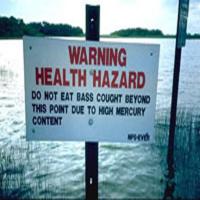Waste. Everyone produces waste. According to a study by Duke University, the average American produces 4.3 pounds of waste per day. This amounts to 254 million tons of trash. 65 million tons being organic waste.

But not all waste is discarded equally. We abandon our garbage dispassionately. Out of sight. Out of mind. Yet, the accumulation of waste is a large problem. What we pour down the drain goes through numerous stages of extraction, distillation, and purification before it is even viable for reintroduction back to the environment. And sometimes, the waste still manages to pollute our water.
One of the most dangerous waste products gleefully ignored is the amalgam-mercury generated by dental restorations and dental extractions. Dental offices are reported to be the main source of mercury deposits in local waste processing treatment centers.
About 10% of mercury manages to find itself in local water systems even after treatment.
They damage, they destroy, and they kill. Mercury from dental filling has been shown (although denied by the ADA) to elevate the risk of cancer. And at the end of it all, we still get billed for it. We even waste our waste.
It is time to change. It is time to change our attitude about waste. To look for viable alternatives for waste management that involves fewer chemicals. To learn the facts about removed amalgam-mercury and our drains.
But what is it going to take for us to change our apathy? Why do we blame everything else but ourselves? Why does it take the government so long to enact legislation to change waste management? The EPA, for example, proposed new rules for discharges of pollutants, especially mercury, into publicly owned treatment works in 2013. What is worse is that the discussions between the American Dental Association and the EPA started all the way back in 2002. The proposed new regulations will not go into affect until summer of 2016. With three years for compliance. That will be almost 20 years between talk and action. Why so much red tape? Why are we a society that ignores the need for change?
The reason is because we are content with apathy. We are satisfied as long our we perceive that our life is not affected in any detrimental way. And corporations depend on that. They capitalize, in fact depend, on our indifference.
And the first step in action is education. Knowledge is the most important tool we have to change the future. Open4BioClean is the place to learn about alternative solutions to organic waste management. The site and its pages are here to help inform and instill changes we can make; changes like organic evacuation system cleaners from Bio-Pure which contain naturally occurring bacteria to eat the waste away. These are small changes, but they reduce health risks and lethal chemical exposures. These are the small changes which will shape our future.
Change is toxic to the status quo. It is motion set against inaction. It brings us out of comfort and into the realization that we need to do something.
Get Smart about BioClean™
